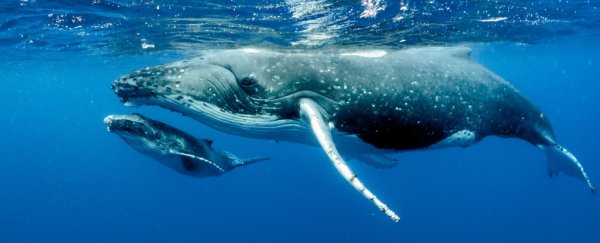After nearly reaching the depths of extinction, humpback whales in the southern Atlantic ocean have resurfaced once again.
New estimates now suggest there are some 24,900 individuals in the Western South Atlantic breeding group (WSA) - nearly 93 percent their number pre-whaling.
It's a resurgence not even the experts saw coming, and a powerful reminder of what the world can accomplish, if only we set our minds to it.
"I expected the recovery to be higher than we'd estimated in 2006," marine biologist Alexandre Zerbini from NOAA told USA Today, "but I wasn't expecting the almost full recovery we found."
For hundreds of years, we humans have relentlessly hunted the humpback whale, killing an estimated 300,000 individuals worldwide. Starting in the 1900s, individuals in the Western South Atlantic were quickly depleted, with nearly 25,000 humpback whales caught in just 22 years.
Soon enough, individuals in the region became scarce. And then, by the mid 1950s, only 450 remained.
Thankfully, it wasn't too late. Following a series of regulations, including a worldwide moratorium on whaling, WSA whales slowly began to recover.
In 2006, researchers estimated that the population in this region had bounced back by nearly a third. More than a decade later, we've realised our mistake.
Tracking and modelling whale populations isn't easy, and new data on their wintering grounds and the pre-modern whaling industry has given us a much clearer picture.
"In the previous assessment, we had a less accurate estimate of population size, and we only had data on modern whaling," Zerbini told Science News.
Using modern air and ship surveys, as well as historical data on whaling, it appears that WSA humpbacks are flourishing once again and are no longer endangered.
And they're not the only ones. In 2016, NOAA reported that nine out of 14 known humpback whale populations have bounced back from endangerment. And while southern populations have done especially well, none have recovered as well as those in the western south.
"The population status is much more optimistic than previously thought," the authors write, "and abundance should reach its pre-exploitation level within the next 10 years or so, assuming mortality from anthropogenic threats remains low."
Of course, climate change could very well change all of that. The oceans are on the front lines of the climate crisis, and recent studies have shown that this whale's favourite food is decreasing and shifting south due to climate-driven processes.
The humpbacks may be coming back for now, but it's up to us how long they stay.
"This is a clear example that if we do the right thing then the population will recover," Zerbini told USA Today.
The study was published in the Royal Society Open Science.
